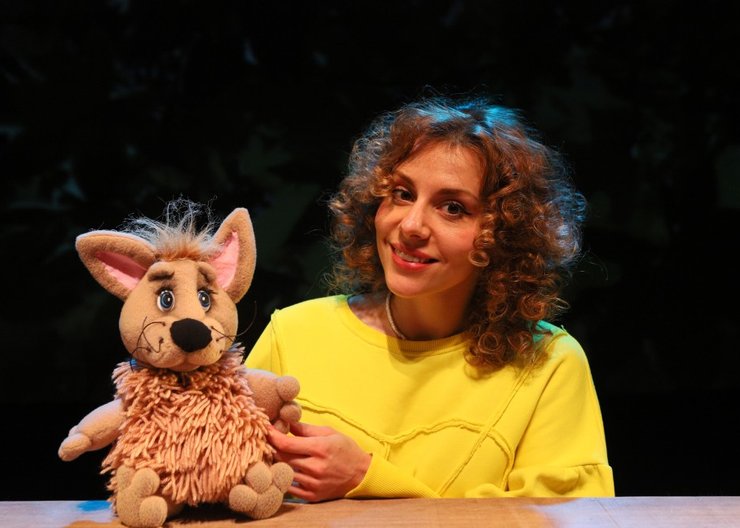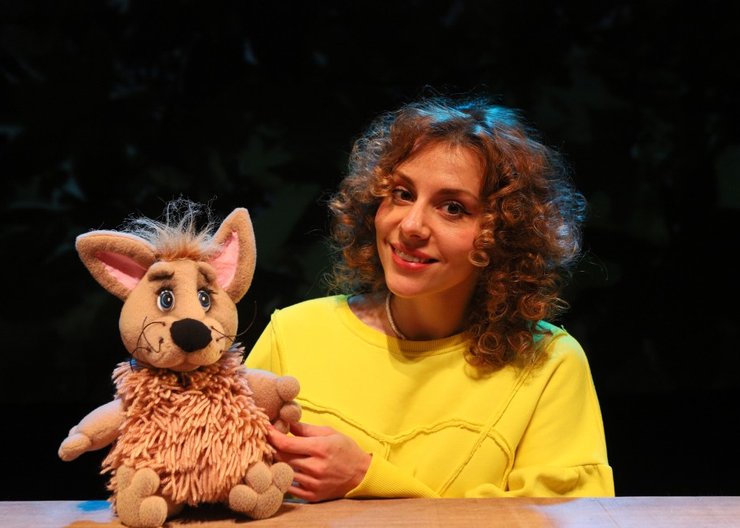Puppet theater actress on why the work of a puppeteer is similar to playing a musical instrument.
Irina Nechitailo: “When you are a good puppeteer, you can revive even a teapot”
Puppet theater actress on why the work of a puppeteer is similar to playing a musical instrument.

The premiere of the children's performance The Dog That Couldn't Bark based on the fairy tale of the same name by the Italian writer Gianni Rodari took place in April at the Krasnoyarsk Puppet Theater. The main role in it was played by a young actress Irina Nechitailo. We talked to her about working in the theater.
– Irina, how can you contact a puppet theater artist? Are there any expressions that an actor might be offended by?
– There are reservations about puppet theater and puppet theater. When we studied, we ourselves said “puppet”, and they corrected us: “Ai-yay-yay, the puppet theater is a small house, and we are a puppet theater!” But now they are also calm about such an expression, and few people beat their chests with their fists for the “real” name. As for the name of the profession, both “puppeteer”, and “puppeteer”, and “puppet theater actor” are correct. We call ourselves that and that.
— How did you get into the profession?
– As a child, I didn’t know what a puppet theater was at all – I had never been to the Irkutsk Theater. Initially, I studied at a ballet school in Ulan-Ude, at the age of 16, due to illness, I had to give up ballet – I decided to become an actress. And that year, only puppeteers were recruited at the Irkutsk Theater School. At first I was upset – it seemed that these were some kind of “squirrel bunnies”, something hackneyed and uninteresting. I still decided to unlearn a year, and then transfer to a drama actor.
I was lucky: the master of the course was the chief director of the Irkutsk theater Aistenok Yuri Utkin, an incredible specialist in his field. It was he who showed us that the puppet theater can be completely different, and magic happens on the stage and it is not clear where the puppet ends and where the person begins. I fell in love with this magic and stayed. Although being a puppeteer is not easy. There are different types of puppets – puppets, glove, cane, muppets, finger puppets, flat ones … And each one needs to be mastered, so the puppeteer has a double load – he must play for himself and for that guy.
– It usually seems that playing in the puppet theater is not difficult: the actor stands, just moves the puppet and speaks in a squeaky voice.
– These are Soviet stereotypes. Now and the time is different, the artist must go to the “living plane”, where the actor and the puppet are partners. The performances have also changed a lot, and we do not hide behind a puppet – we sing, dance just like the actors of the drama. Again, it seems to me that it was fashionable then to make a voice like from a cartoon. At the moment, this is almost non-existent, the director most often repels the capabilities of the actor and his organics. The whole theatrical world strives for naturalness in the image, including in the puppet theater.
– I know that many viewers go to the theater to the actor.Is there such a thing in the puppet theater? Do they see you behind the doll?
– Not as often as in other theaters, but it happens. I remember that after the premiere of the play The Train, a girl came to me backstage and gave me a homemade unicorn. Her mother said that they go to me: “We love you very much and follow your performances. Your daughter sewed a unicorn for you.” It was very nice. Such situations are quite rare – in my practice there were a couple of such spectators. Children remember a bright doll rather than an actor. There was another story. In 2014, we staged the play My Magic Sock for the little ones. This production opened the baby scene for 24 spectators. Then a little spectator came to see me at the premiere. She also attended this performance in 2022. Eight years have passed, and already a 12-year-old girl came up to me and said that she was at that same premiere. At that moment, of course, I felt very strange: “What? How many years have passed? How old am I then?!”
– Do you have any favorite roles?
– Rather, favorite performances. My Magic Sock is my favorite. Firstly, this is a one-man show, you are alone on stage with a doll, there is nothing but you, a hero sock and a basket. No music or scenery. There are 12 children in front of you, and you have nothing and no one to hide behind. Then no one else did baby performances, and there was a feeling of jumping into an ice hole. You stand as if naked, and you need to fill the hall with your energy and keep the attention of the children throughout the performance. It seems to me that baby performances are a very important experience, it is not for everyone.
— Do puppeteers have “dream roles”? For example, every dramatic actor dreams of playing Hamlet.
“Puppeteers have the same dreams. The same Shakespeare is staged, and you want to play Hamlet or Ophelia. Or there is special material you want to play. For me, it's Maeterlinck's The Blue Bird. I love this fairy tale – it seems to me that the material is completely puppet. Ready to play any role.
– You have to get used to the role. Do you need to get used to the doll?
The doll is like a musical instrument. Even if you, for example, are a guitarist and already know how to play, you have to adapt to each new instrument. Same with the doll. You need to get used to her, find out how she walks, lies, sits, if she looks at you, then at what angle. And during the performance, when you bring your hero to the fore, then no one should pay attention to your face, at that moment you are not playing, but the character is in your hands.
– You said that there are many types of dolls with a variety of controls. What are your favorites?
– The most interesting for me are circus puppets. They are on strings, like regular puppets, but they have their own trick – for example, she can juggle or walk on her hands. Unfortunately, few people make such dolls, because it is quite expensive and difficult. But they are interesting for the artist in terms of puppetry.
When you're a good puppeteer, you can even bring a kettle to life. I am personally interested in working with small dolls.In the conditions of intimacy, every gesture must be verified. Probably, the ballet past affects – I dance with puppets. Of course, the huge reed puppets of the Chinese theater, such as the dragon, are also impressive.
– The theater recently hosted the premiere of the play The Dog That Couldn't Bark. What is the show about and why is it worth watching?
– The idea is very simple – how important it is to have your own voice. Once upon a time there was a Dog that did not meet other dogs. And she wanted to learn how to bark, but she did not know how to do it. And everyone she met tried to teach her in their own way: the Rooster – to crow, the Cuckoo – to crow, the Farmer generally believed that the Dog needed to keep quiet. And only after meeting another Dog, she realized what her voice should be. I would recommend everyone to watch the show. This is one of the few productions where there are no negative characters. All the characters have different personalities, and they are not evil. Lately I've been wondering how important this is. When there is a lot of aggression and negativity around, it is important to laugh at simple jokes and relax your soul a little.
Recommendation
Irina Nechitailo advised which performances in the puppet theater should be paid special attention to.
– The first performance for very young – All year round, about the seasons without words. A very lyrical performance.
— For children under 12 — The Dog That Couldn't Bark.
— For teenagers — “I am a fist. I AM ANNA. The performance makes you think. It's about how often they don't hear us. About bullying, school and your place in the world.
— For adults — Imaginary Sick for fun, or The Recluse and Six-Fingers for reflection.
Dossier
Irina NECHITAILO
Date and place of birth: January 1, Irkutsk
Education: In 2010 she graduated from the Irkutsk Theater School with a degree in Actor-puppeteer and head of the creative team (course master – Yuri Utkin).
Career: from 2010 to 2011 she worked in the troupe of the Irkutsk puppet theater Stork. In February 2011, she entered the service of the Krasnoyarsk Puppet Theater. From 2016 to 2018, she taught acting and was the developer of children's educational programs at the Open Youth University. She staged a private performance for the little ones Very Voracious Caterpillar. In 2018 she returned to the troupe of the Krasnoyarsk Puppet Theater.
